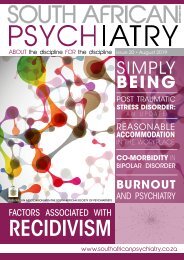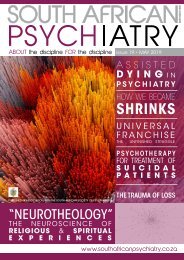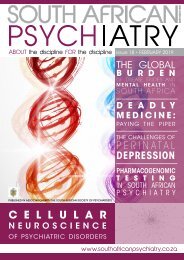South African Psychiatry - November 2018
South African Psychiatry - November 2018
South African Psychiatry - November 2018
You also want an ePaper? Increase the reach of your titles
YUMPU automatically turns print PDFs into web optimized ePapers that Google loves.
SASOP<br />
SOUTH AFRICAN SOCIETY OF<br />
PSYCHIATRISTS<br />
• Objective of the Act<br />
Section 4 – to refer to “comprehensive health<br />
care services.”<br />
Thus, “to establish a Fund that aims to achieve<br />
sustainable and affordable universal access to<br />
comprehensive health care services …”<br />
• Duties of the Fund<br />
Section 5(3) – To amend as follows in italics: The<br />
Fund must support the Minister in fulfilling his<br />
or her obligation to protect, promote, improve<br />
and maintain the health and mental health of<br />
the population as provided in section 3 of the<br />
National Health Act and section 4 of the MHCA.<br />
• Eligibility as beneficiaries of the Fund<br />
Section 7 – This section does not appear to uphold<br />
Section 27 of the Constitution, which does not<br />
differentiate between persons. We believe that<br />
excluding any individual from needed health<br />
care services, particularly if they suffer from a<br />
mental illness which impairs psychosocial and<br />
cognitive function, is inhumane.<br />
The requirements raise serious concerns for<br />
PLWMI &/or ID, such as:<br />
o PLWMI &/or ID often have severe childhood<br />
adversity; biological parents and relatives<br />
may not be traceable, and the psychosocial<br />
and/or intellectual disability may be such that<br />
they have difficulty accessing government<br />
social and home affairs services. Provision<br />
must be made that they are not refused<br />
treatment because they are not registered<br />
with a primary health care facility or have no<br />
<strong>South</strong> <strong>African</strong> Identity Document.<br />
o Migrants, refugees and asylum seekers are all<br />
at higher risk of mental illness than the general<br />
population. Serious mental illness tends to be<br />
chronic and relapsing and causes severe<br />
functional impairment. The Bill excludes<br />
them from mental health care services other<br />
than emergency care, notwithstanding their<br />
extreme vulnerability.<br />
o Mental illness worsens maternal and foetal<br />
outcomes of pregnancy. However, migrants<br />
to <strong>South</strong> Africa are only entitled to maternal<br />
care at primary health service level, even if<br />
the pregnancy is high risk.<br />
o Many travel insurance policies exclude<br />
cover of any mental illness, including index<br />
presentations.<br />
• Rights of users<br />
Section 9(m) to include a clause referring to the<br />
ethical obligation to breach confidentiality if a<br />
risk to public health is identified, as in the NHA<br />
Section 14(2)(c), or if there is a risk of harm to<br />
the user or others, as in the MHCA Section13.<br />
• Reimbursement for services rendered and<br />
referral to specialists<br />
Section 10(2)(c) – To add a proviso that the<br />
user’s complaint is adequately addressed at the<br />
initial health establishment. This must include a<br />
proviso that people with difficulty in expressing<br />
themselves, explaining their needs, or containing<br />
their behaviour, are accommodated with<br />
additional time and attention so that the health<br />
or mental health need is addressed appropriate<br />
to the level of severity of the condition.<br />
o Such individuals must not be penalised for<br />
seeking health care at a more specialised<br />
service level if the primary health care provider<br />
has not identified or treated the health or<br />
mental health problem appropriately or has<br />
not recognised the need to refer the user.<br />
o Psychosocial and intellectual disability of<br />
PLWMI &/or ID places them at risk of having<br />
delayed or inadequate health care.<br />
• Health service benefits coverage<br />
Section 11(2)(a) and (b) – Must include<br />
intersectoral referral pathways, with entry into the<br />
health system by referral from non-health sectors<br />
such as Social Development, Justice, Correctional<br />
Services, and Education. Such referral into the<br />
health system must be appropriate to the severity<br />
of illness and level of health need, particularly<br />
for PLWMI &/or ID, who often present first to nonhealth<br />
sector services. Severe illness may not be<br />
recognised as an emergency if not disruptive or<br />
acute, but still requires urgent specialist rather<br />
than PHC attention.<br />
Section 11(4) – The Benefits Advisory Committee<br />
must consider burden of disease and population<br />
needs, not only the potential funds available.<br />
Recommendations must be in proportion to<br />
desired health care outcomes, not to funding. Funds,<br />
and their judicious use, must then be allocated<br />
according to the desired health outcomes.<br />
o Making recommendations based on<br />
available funds without considering health<br />
outcomes places vulnerable people at high<br />
risk of neglect.<br />
SOUTH AFRICAN PSYCHIATRY ISSUE 17 <strong>2018</strong> * 75

















